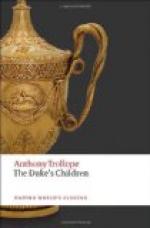In truth he saw everything as it was only too truly. Though she might choose to marry him if he pressed his request, she would never subject herself to him as he would have the girl do whom he loved. She was his superior, and in every word uttered between them showed that it was so. But yet how beautiful she was;—how much more beautiful than any other thing he had ever seen!
He sat on one of the high seats behind Sir Timothy Beeswax and Sir Orlando Drought, listening, or pretending to listen, to the speeches of three or four gentlemen respecting sugar, thinking of all this till half-past seven;—and then he went to dine with the proud consciousness of having done his duty. The forms and methods of the House were, he flattered himself, soaking into him gradually,—as his father had desired. The theory of legislation was sinking into his mind. The welfare of the nation depended chiefly on sugar. But he thought that, after all, his own welfare must depend on the possession of Mab Grex.
CHAPTER 20
Then He Will Come Again
Lady Mabel, when her young lover left her, was for a time freed from the necessity of thinking about him by her father. He had returned from the Oaks in a very bad humour. Lord Grex had been very badly treated by his son, whom he hated worse than any one else in the world. On the Derby-day he had won a large sum of money, which had been to him at the time a matter of intense delight,—for he was in great want of money. But on this day he had discovered that his son and heir had lost more than he had won, and an arrangement had been suggested to him that his winnings should go to pay Percival’s losings. This was a mode of settling affairs to which the Earl would not listen for a moment, had he possessed the power of putting a veto upon it. But there had been a transaction lately between him and his son with reference to the cutting off a certain entail under which money was to be paid to Lord Percival. This money had not yet been forthcoming, and therefore the Earl was constrained to assent. This was very distasteful to the Earl, and he came home therefore in a bad humour, and said a great many disagreeable things to his daughter. ‘You know, papa, if I could do anything I would.’ This she said in answer to a threat, which he had made often




